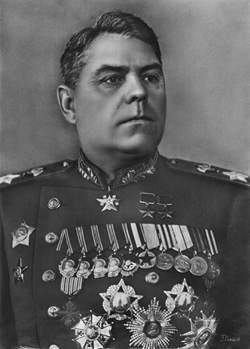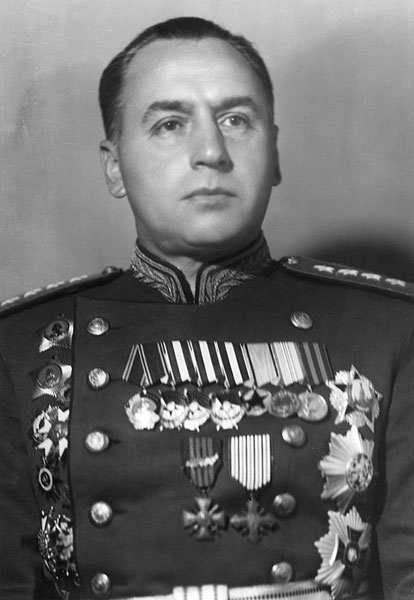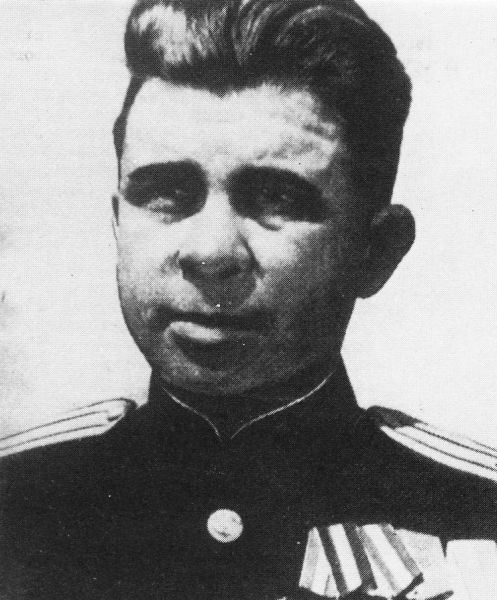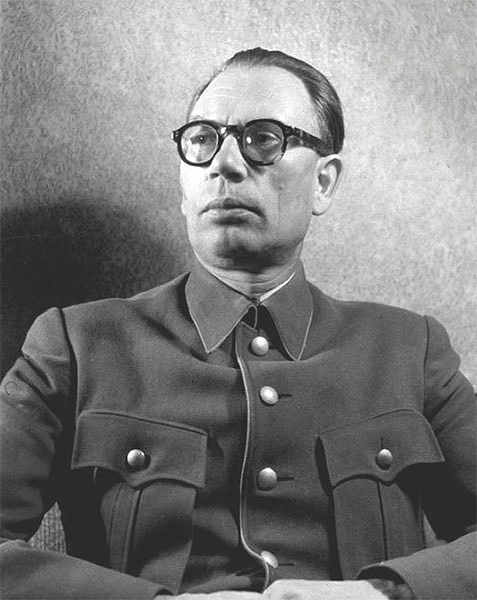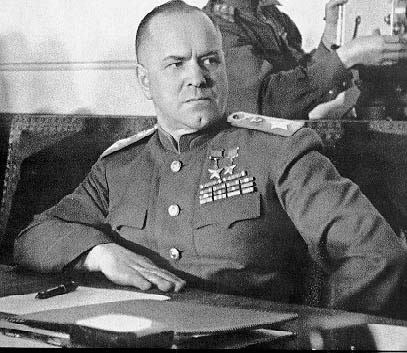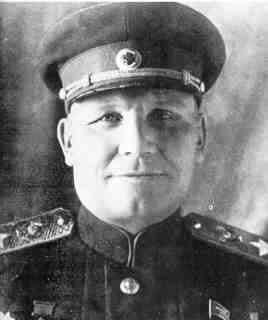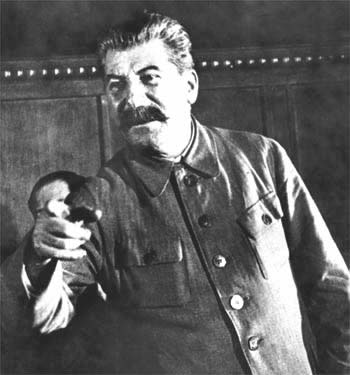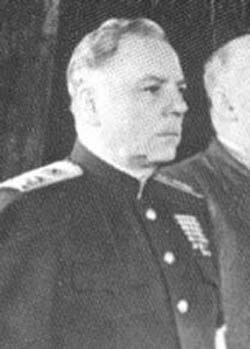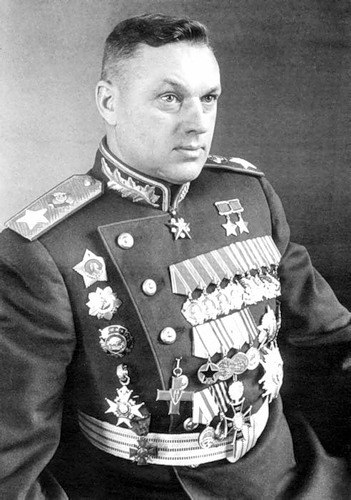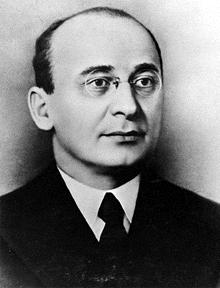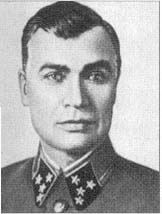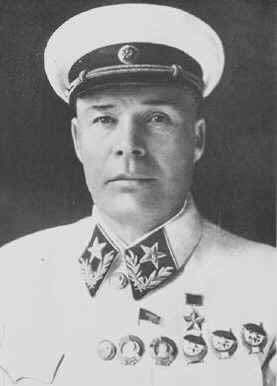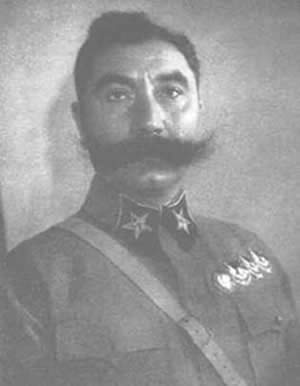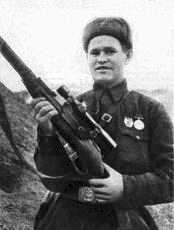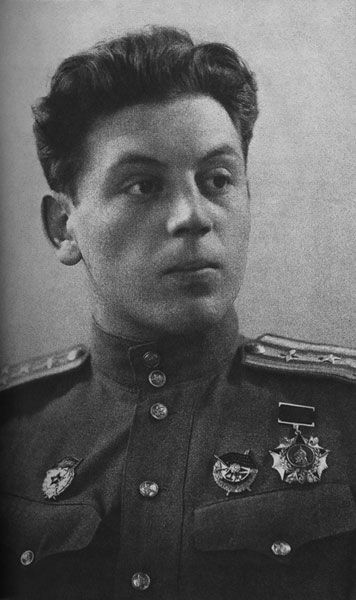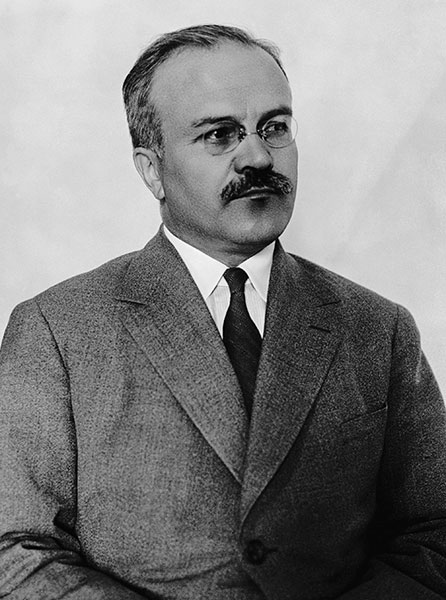Articles
- Article by Auke de Vlieger
- Published on February 16th, 2017
Aleksandr M. Vasilevski
Aleksandr Mikhailovich Vasilevski was born September 30th, 1895 in Novaya Golshikha, a village east of Moscow. His father was a Russian-orthodox priest. Although Alexandr wanted to become a farmer or a teacher he did attend the Spiritual School in Kineshma and subsequently the Spiritual Seminar in Kostrona. He did not graduate however from this seminar as he joined the military.
- Article by Auke de Vlieger
- Published on June 24th, 2017
Aleksey I. Antonov
Aleksey Antonov is not among to the best known Soviet generals but experts consider him one of the most highly gifted staff officers of the Red Army. He was known for his broad theoretical knowledge, his intelligence, calm and mental strength. From December 1942 onwards, he headed the Directorate of Operations and from February 1945 he was Chief of the General Staff, making him closely involved – usually as a member of the triumvirate Zhukov (Bio Zhukov) – Vasilevski – Antonov – in planning almost all major operations of the Red Army.
- Article by Peter Kimenai
- Published on September 4th, 2021
Alexander I. Marinesko
On January 30, 1945, at 21:45 hrs. The Nazi vessel Wilhelm Gustloff was hit by a torpedo. Moments later, a second and third torpedo hit the German ship with over 10,000 people aboard of whom almost 9,000 were civilian refugees. Seventy minutes later the former Nazi cruise ship was sunk and over 9,000 persons aboard were dead. The sinking of the Wilhelm Gustloff is recorded in history as the greatest maritime disaster of all times. The three torpedoes were fired by the Soviet submarine S-13, under the command of Kapitan III ranga Alexander I. Marinesko. During the same mission, the S-13 sank another large German evacuation ship. On February 10, 1945, the Steuben was sunk by two torpedo hits. Nearly 4,000 persons aboard were killed in this disaster, again, most of them German refugees.
- Article by Auke de Vlieger
- Published on March 6th, 2022
Andrei A. Vlasov
In July 1942, amidst the marshes southeast of Leningrad, a Soviet army was surrounded and forced to surrender. Among the prisoners was the commander of this army, Lieutenant-General Andrei Vlasov, a talented and dedicated officer, considered a favourite of Stalin. During his captivity, he decided to turn against the Soviet state and established – with German support – the ‘Russian Liberation Army’. The story of Vlasov continues to provoke divided reactions – on the one hand, a school that considers him an opportunistic traitor and, on the other, his supporters who consider him a patriotic martyr.
- Article by Tom Notten
- Published on January 23rd, 2020
Georgi K. Zhukov
Gheorghi Konstantinovich Zhukov was born December 1st, 1896 in Obinskoye in the vicinity of Kaluga. He grew up in bitter poverty and at the age of 10, he left for Moscow with his uncle to go and work in a factory.
- Article by Tom Notten
- Published on October 11th, 2016
Ivan S. Konev
Ivan Stepanovich Konev was born December 28, 1897 in Lodeino, the son of an agricultural worker who was also engaged in trade. During his youth, Konev worked the land of his parents.
- Article by Tom Notten
- Published on September 26th, 2016
Joseph Stalin
Joseph Stalin is undoubtedly one of the most spoken of statesmen of the 20th century. His successor Chrushev said after Stalin’s death: "Just like Peter the Great, he fought barbarism with barbarism," but Stalin was not only barbaric towards the German intruders. He also terrorized his own population to expand his authority. That way he let millions starve to death in the 30s, he had them murdered and deported to labor camps in Siberia.
- Article by Tom Notten
- Published on March 23rd, 2017
Kliment Y. Voroshilov,
Kliment Yefremovich Voroshilov was born February 4th, 1881 in Verhneye in what is now the Ukraine. His father was a railway employee and Kliment went to work himself in a coal mine at the age of 7. When he was 16 years old, he joined a revolutionary movement which had as its goal to overthrow the Czarist regime, just like all other revolutionary movements of the time.
- Article by Auke de Vlieger
- Published on April 16th, 2017
Konstantin K. Rokossovski
Konstantin Konstantinovitsj Rokossovski was born December 21 1896 in Velikiye Luki, a village near Pskov in northern Russia. His father was Polish and was employed as a train driver, while his mother taught Russian. Shortly after he was born, the family moved to Warsaw, at the time still part of Czarist Russia. Konstantin attended school there but had to quit early because of the death of his father in 1905 and of his mother in 1911. Konstantin earned a living as stonemason, bricklayer and jack-of-all-trades.
- Article by Arnold Palthe
- Published on October 5th, 2016
Lavrenty P. Beria
Lavrenty Pavlovich Beria was born on March 29th , 1899 near Suchumi in Georgia. After the revolution he joined the Bolshevists at the age of 18. A few years earlier, Beria had left his parental home and he studied at the technical school in Baku in Azerbeidjan. The future chief of the NKVD graduated in 1919.
- Article by Tom Notten
- Published on June 17th, 2020
Mikhail P. Kirponos
Mikhail Petrovich Kirponos was born January 9, 1882, in Vertiyevka Chernigovskoi, a small village in the countryside in the Shumeikskogo area near Lokhvitsi (Poltava). He came from a family of farmers and during his youth years, he worked on the land of his father. During World War 1 he fought on the front against the Germans in the army of the Czar. At the end of the war, he joined the Bolsheviks and became a member of the Red Army. During the bloody, three-year civil war, Kirponos soon rose in the ranks of the Red Army. At the time, there were no ranks in the army but he rose from battalion commander to regimental commander. After the Red Army had won the war, Kirponos became Kommissar in various divisions, occupying himself mainly with staff work. From 1934 to 1939 he stood at the head of the military academy of Kazan.
- Article by Tom Notten
- Published on February 12th, 2017
Semyon K. Timoshenko
Semyon Konstantinovich Timoshenko was born on February 18th, 1895 in Furmanka (Bessarabia, the present Moldavia). As a child he worked at the farm of his parents until he was called up for military service in the Czarist army, in order to fight the Germans during World War One. He was sentenced to a few years in prison by a court martial for having insulted an officer. He managed to escape though and joined the Bolshevist Red Army in the civil war against the White Army.
- Article by Tom Notten
- Published on April 14th, 2017
Semyon M. Budyonny
Semyon Mikhailovich Budyonny was born April 25 1883 in a small Cossack village in the vicinity of Kuban in the Caucasus. He started his military career in the Czarist army. He served in the cavalry during the Russo-Japanese war of 1905. When Russia got involved in World War One, Budyonny was placed in command of a cavalry brigade in the Czarist Army.
- Article by Auke de Vlieger
- Published on January 6th, 2020
Vasily G. Zaitsev
Vasily Grigoryevich Zaytsev was a Soviet lieutenant who became well known for his role as a sniper during the battle for Stalingrad.
- Article by Auke de Vlieger
- Published on January 17th, 2016
Vasily Stalin
Vasily Iosifovich Stalin was born in Moscow on March 21, 1921. He was the first child of Joseph V. Stalin and his second wife, Nadezhda S. Alliluyeva. The Soviet dictator-to-be was already 40 years old when he married the 17-year-old Alliluyeva, and had a 12-year-old son with his first wife and a secret, illegitimate son aged seven. The marriage between Stalin and Alliluyeva, who kept her maiden name, was a difficult affair with lots of quarrelling. Stalin very much wanted a daughter and when Vasily was born in 1921, he was sad. He did not speak to Alliluyeva for a month and eventually Alliluyeva announced that she would leave him. The two made it up again but it took another five years before their second and last child, Svetlana was born.
- Article by Auke de Vlieger
- Published on April 17th, 2016
Vyacheslav M. Molotov
Vyacheslav Molotov was one of the most powerful men of the Soviet Union. He was Prime Minister of the Soviet Union from 1930 to 1941 but Molotov has become known most of all as the People's Commissioner for Foreign Affairs, a post he held for 13 years. When he accepted this post in May 1939, he had no experience whatsoever in the field of foreign policy but he proved to be gifted. Friend and foe alike acknowledged Molotov as an exceptionally talented diplomat. Although his contempories described him as a dull, opinionated and self-centered bureaucrat, at the same time he could display a casual ruthlessness towards the victims of the Stalinist regime. As intimus and confidant of Joseph V. Stalin, he played an major role in the terror regime that characterised the Soviet Union under Stalin. He readily admitted later he had put his signature to countless death sentences. In particular, Molotov owed his succesful career mainly to his unconditional loyalty to his mentor Stalin, something which applied to many other prominent Soviet politicians. For a long time, Molotov was considered Stalin's possible successor and he continued defending Stalin's controversial heritage fervently until his death in 1986.
